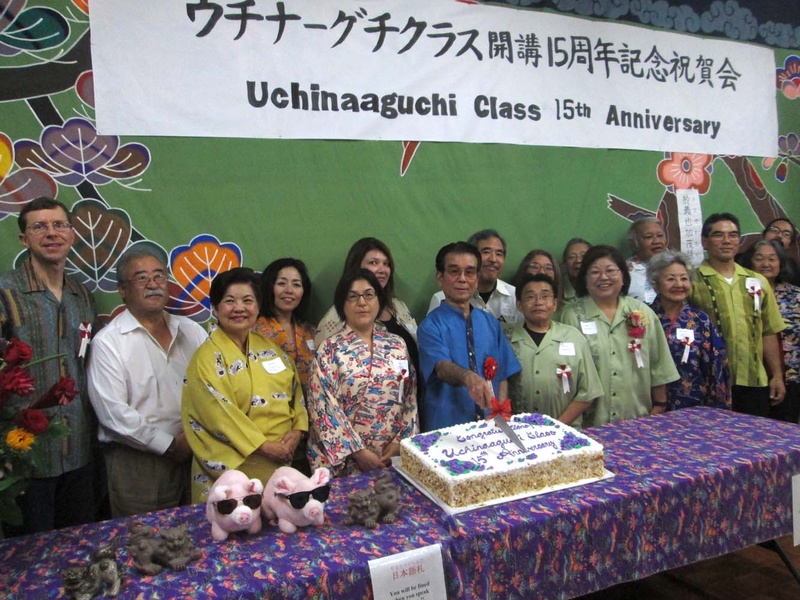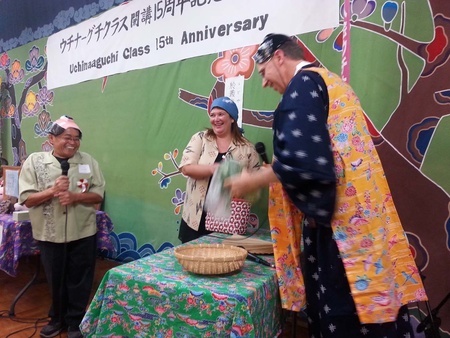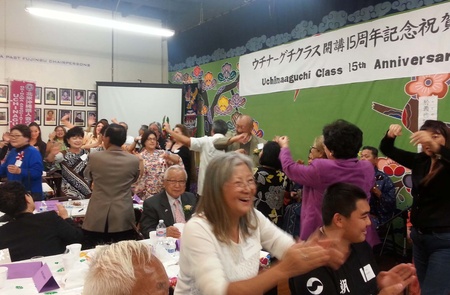"Katayabira Okinawan"
The North American Okinawan Association (Gardena, a suburb of Los Angeles), known for its active activities, has opened a course on Uchināguchi. Uchināguchi is a language originally spoken in the Ryukyu Kingdom. Even for people from Okinawa Prefecture, it is difficult for the younger generation to understand Uchināguchi, which is far from standard Japanese.
The course celebrated its 15th anniversary in 2017. Higa Chogi, the founder and current instructor of the course, said, "I have always felt that something was missing when it came to passing on Okinawan culture to the next generation. We were in danger of losing the language that our parents and grandparents spoke to us in Okinawa. When I became president of the Okinawan Association of North America, I made it a high priority to open a class where people could learn the Okinawan language."
Higa named the course "Katayabira Uchinaaguchi," which means "Let's speak in Okinawa." When Higa was a student in Okinawa, he was forced to speak standard Japanese at school. If he spoke Okinawan, he was punished by having a board with the words "Dialect Tag" written on it hung around his neck. However, this also meant suppressing the unique language that was once spoken in the Ryukyu Kingdom. Higa had a strong desire to help the younger generation take root in the cultural heritage that was on the verge of fading, and 15 years ago, decades after the dialect tag, he put it into practice in the United States.
Okinawa's history to learn
The 15th anniversary celebration of the "Katayabira Uchinaaguchi" course was held on a weekend in November and was a huge success, with a full house. What impressed me most about attending was the presentations that the students gave in Uchinaaguchi about why they were learning Okinawan languages. I couldn't understand a word they were saying, but I was able to get the meaning from the English translations that were projected on the screen.
Michelle Konishi, whose father is American, does not look like she speaks Uchinaaguchi from her appearance. However, she grew up in Okinawa until the age of 19, listening to her mother speak to her grandmother. Although she was able to understand Uchinaaguchi, she was not able to speak it herself. Recently, she had a turning point. "When I went back to Okinawa this summer, I heard from my grandmother that she had been hiding in the graves of her ancestors during the war. When I heard that story, I thought there must be more Okinawan history that I should learn," she said, explaining the reason for her decision to attend the class.
Robin Arakaki, a second-year student, first started learning Okinawan music through the sanshin. "It's beautiful music, but I don't understand what I'm singing. I decided to learn Okinawan tunes because I wanted to understand the lyrics I'm singing. It's been two years, and there are still lyrics I don't understand. But I'm definitely learning more. I'm grateful that Mr. Higa teaches me about the history and culture of the Ryukyus. It's very important to understand the culture and language."
Joan Arakaki, also in her second year, recalled that before she started the class she thought it would be easier: "I had learned Japanese before, so I didn't think I'd have any trouble with Uchinaaguchi. But in fact, I learned in class that it's difficult and not at all similar to Japanese. There are some words that are similar, but most are different. In this class, I learned a lot about Okinawa that I didn't know before."
Brian Arakaki, a third-generation Okinawan, gave a very informative presentation. "I introduced myself as Japanese. Then I learned that my family is from Okinawa. When I visited Okinawa in 2014, I realized that my roots are in Okinawa." He then mentioned "chimugukuru" and "icharaibachodeh" as words that have great meaning to him. The former means "the kindness of the Okinawan people," and the latter means "once we meet, we are all brothers."
Cindy Arakaki Wicker's mother is from Shuri, Okinawa. When she lived in Okinawa, she grew various vegetables on a farm, and she explained about the medicinal herbs that are highly valued in Okinawa, including mugwort.
Reiko Higa, a first-generation Okinawan, recalled her memories of attending Ginowan Elementary School: "If we spoke in Okinawan, the teachers would wear a dialect tag around our necks as a punishment. Now, after so much time has passed, I'm really happy to be able to revive the Okinawan language I used to speak to my grandmother and mother in Okinawa."
A deep respect for the roots and the warmth of the people
Next up was Julian Ellie, an American. His roots are not in Okinawa. However, he spoke Okinawan fluently. I couldn't tell, but the people around me all commented in admiration. Julian cited the warmth of the people as the reason he became a student. It seems that the kindness he received from the Okinawan people motivated him to learn more about Okinawa. And he has been attending the class since it first opened, for a total of 15 years. It's no wonder he speaks Uchinaaguchi fluently.
Don Akamine, who started attending Uchinaaguchi classes with his daughter Tamiko and has also started learning the sanshin with her, said he wants to continue learning about Okinawan culture for the rest of his life.
Fifth-year students Mitsuo Nishiuchi and Vicky Oshiro Nishiuchi are a married couple. Mitsuo was born in Fukushima Prefecture, but Vicky's roots are in Okinawa. Vicky and her husband visited Okinawa, where they met their relatives, visited their ancestors' graves, and ended the trip with a great time at a banquet surrounded by many relatives.
Jane Hatsu Kuniyoshi, a grade 8 student, is a third-generation Okinawan born in Hawaii. Jane vividly expressed her joy in Okinawan language when she was blessed with her first grandchild.
Herbert Asato, a 15-year student, also shared an episode from his visit to Okinawa with his son during the World Uchinanchu Festival in 2011. He said he was touched by the kindness of the people there when a woman he had never met before kindly showed him the way.
Again, all of this was said in Okinawan. The roots of their motivation are their feelings for their roots and people, and their sense of mission to pass on traditional culture. I would like to express my heartfelt respect to Mr. Higa Chogi, who has led the students for 15 years, and hope that he will continue to do so in the future.
© 2017 Keiko Fukuda








